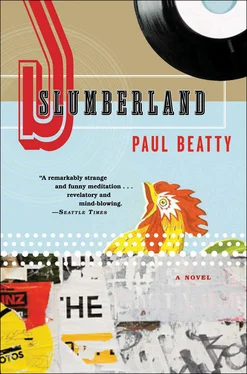In the middle of Leninplatz I cruised past a bearded black man stacking bits of broken brick and ill-fitting rocks into a makeshift barricade. I joined the other onlookers and watched him extend the wall into the street.
I have a tendency to remember the names but forget the faces, and I wished that I’d been born with a photographic memory and not a phonographic one. Because here was a man who, during the interminable time I’d been looking for him, I had heard but not seen. He’d been in the Slumberland, asked me for money on numerous occasions, and this was the first time I’d bothered to truly look at him.
Charles Stone looked nothing like I’d imagined, yet how could I have missed him? A garish, evergreen three-piece suit set off his complexion nicely. The redbone, wrinkled skin, more photosphere than epidermis, still had a faint, rusty, Creole glow and reminded me of the setting sun I missed so much. His hair burst from his skull like an erupting solar flare. I don’t know if he or the wind was responsible for combing it, but the gigantic afro swept from back to front, a graying red-tide tidal wave that crested over his forehead as if it were about to crash onto his freckled brow. Emaciated yet exceedingly energetic for his age, he moved in jangled fits and starts like a string puppet.
Though his face and physique were new to me, I already knew exactly what he sounded like. He breathed through a deviated septum in labored, wheezy, whistles. Sometimes when he closed his large, snarled hands, his knuckles popped loud and clear like oily kernels tossed into the frying pan. He gnashed his teeth. His wristwatch ticked softly, like a hushed cricket unsure of the temperature. He always carried large amounts of change that, with each step he took, jingled as if he had sleigh bells in his pocket. When he scratched the back of his dry, bristly head, it sounded like a little boy gathering kindling in the forest.
Heroes. Idols. They’re never who you think they are. Shorter. Nastier. Smellier. And when you finally meet them, there’s something that makes you want to choke the shit out of them.
Blaze always said that one of my best qualities was that I’m never impressed by anyone. He was afraid that if I did locate the Schwa I wouldn’t be fazed, and my lack of acolyte appeal would make him not want to play with me.
“Man, you have to flatter motherfuckers like Charles Stone.”
For a second I thought about tearing across the street and calling the Beard Scratchers one by one. Pretending that I was more excited than I was.
“Dude, you’ll never guess who I’m looking at right now. . the Schwa, man. . I shit you not.”
But that would’ve been like Christopher Columbus returning to Queen Isabella with nothing to show for his voyage save a drippy case of syphilis. No, the Beard Scratchers would be notified when the mission for the Perfect Beat was complete.
The Schwa was serious about his work. After examining his pile of stones, he’d carefully select the rock he felt would best fit into the open crevice. If a block had to be shaved or cut down, he filed it by scraping it over the blacktop or dashing it against the curb. For mortar he used a boundless optimism that was constantly being tested by the rumbling vibrations of the passing trucks.
A motorcycle cop with thin cold eyes stepped off a brand-new BMW K100, and though he knew full well what the Schwa was up to, he asked the gathering what was going on.
“He’s rebuilding the Berlin Wall,” someone announced.
“Looks more like the Berlin Partition,” the officer said, and though it wasn’t very funny, the crowd, me included, laughed.
The cop snapped his fingers and Stone handed over a tattered but important-looking piece of paper, which the officer glanced at and quickly handed back. The cop waved a leather-gloved finger at a huge billboard that hung overhead. We all peered up at the advert for West brand cigarettes. Two crude-oil-black “homeboys,” dressed in black from sneaker to wool cap, stood against a white background, gangster posing and brandishing smokeless cigarettes over the caption TEST IT.
“Do you remember the watchtower that once stood there?” Heads nodded. The Schwa added a stone, oblivious to the socialist nostalgia. The officer stuffed his cap under his armpit and said something in Russian, which broke everybody up.
Then a haphazardly built section of the wall avalanched onto the street, blocking traffic. A man on the east side of the wall playfully leapt through the opening to freedom. A woman closed one eye and squeezed off a couple of finger shots at his back. A few others grabbed the fallen bricks and set to repairing the breach.
Slowly walking over to his bike, the cop removed two small orange safety cones from the saddlebags and set them down in front of the wall. A sharp whistle blast and a stern look sent the halted traffic around the wall in an orderly fashion.
“Mr. Stone?”
The Schwa clucked his tongue and pouted like a kid who’d been found in a decadelong game of hide-and-seek. He tapped a brick into place with the butt end of his trowel, a trowel that had never seen an ounce of cement and gleamed in the sun. I didn’t waver. Fuck the salutations. The ass kissing. I told him a joke.
“What do you call a jazz musician without a white girlfriend?”
I paused for effect, and he, pissed that I’d managed to pique the curiosity of a man who’d thought he’d heard and seen it all, idled for the briefest of moments, readjusting a brick that didn’t need readjusting, and asked, “So what do you call a jazz musician without a white woman?”
“Homeless.”
I DIDN’T KNOW IT THEN, but the afternoon Charles Stone spoke to Doris, he’d broken a vow of silence that was more than twenty years old. It was a sacred pact he’d taken with his larynx and his instrument the day trumpeter Lee Morgan died, shot to death by his fed-up woman, in some long-forgotten New York jazz café. When he entered the Slumberland and heard something in my music that invoked Lee Morgan’s hard-bop verve, it gave him hope. Though after I’d gotten to know him it was a vow that I often wished he’d kept.
I wanted to subtly reintroduce the Schwa to the music industry and felt that a “listening session” for the latest album of the apple-bottomed pop star La Crème (italics music company’s) would be the perfect time.
Lars and a few other journalists (referred to by the company as “music partners”), the sales staff, and a few marketing executives sat in the record company’s grandest conference room. Doris was there to cater the drinks. I was there to DJ. La Crème ’s father entered the room to boisterous applause trying its best to sound spontaneous and genuine. A tall, black American, he looked like the best man at a motorcycle gang leader’s wedding.
He wore a black leather suit that had Indian frills running down the sleeves and pant seams. His presentation was war room slick. There were charts and projections, battle plans and objectives. On command I played four songs from the album and during each one he’d say, “Crank it up, this is the jam.” Between “jams” he explained the concept of the album. There was the crossover club song, the R&B ballad — but La Crème hadn’t forgotten “her core audience,” he insisted, and to prove it he played one last cut, “Soldier,” the album’s title track. Supposedly, “Soldier” had what he referred to as a “street vibe.” When the song ended he pressed his fists into the shiny mahogany conference table and exhorted his minions. “We need, no, we demand a number-one album, and I expect all of us in this room to do our jobs: salespeople, media partners, everybody!” He cut his bloodshot eyes at us and asked, “Are you all soldiers for black music? Warriors for neo-soul?” After the meeting ended he grabbed Lars by the elbow.
Читать дальше












